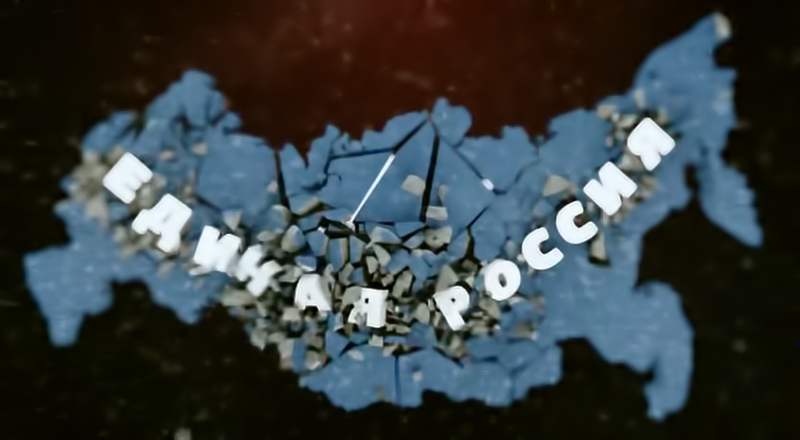
Exploding logo of the United Russia party. A still from the video that got a Siberian blogger in trouble with the law. YouTube screenshot.
Regional authorities in Russia are cracking down on local opposition bloggers, persecuting them for alleged “extremism.” On November 6, 2013 Andrey Teslenko, a blogger from the Siberian town of Novoaltaisk, announced on his LiveJournal blog [ru] that he was approached by police who questioned him about a video called “Let's remind the crooks and thieves about their 2002-Manifesto,” which appears on his page [ru] on the social network VKontakte.
Teslenko did not author the video or even upload it — he merely re-posted an October 28, 2013 post [ru] by the leading opposition blogger Alexey Navalny. In his post Navalny was making light of the fact that a regional Novosibirsk court has included the 2011 video (easily found on Navalny's YouTube channel [ru] where it has over 2 million views) in the federal list of “extremist” media [ru]. It is indeed unclear why the video, which calls on people vote for any party but United Russia because they are “crooks and thieves,” made it to a list that includes an image of a boy, hand raised in a Nazi salute, with a caption “Death to the Jews.”
Teslenko is among 1004 VKontakte users who had shared Navalny's post, and according to him others might be in danger as well:
Кстати, менты эшники обмолвились, что в Барнауле в связи с этим роликом посетят не одного меня.
By the way, the anti-extremism cops let slip that I'm not the only one to be visited in Barnaul [regional center -A.T.]
According to a comment [ru] on Teslenko's post, the worst he faces for an administrative infraction (Article 20.29 of the Administrative Codex) is a fine of 1000 rubles, which he doesn't even really have to pay. However, on the same day that Teslenko blogged about his legal troubles, another regional blogger was actually arrested for a similar offense — but this time the Criminal Codex is involved.
Stas Kalinichenko, a blogger from Kemerovo (another Siberian city, 250 miles away from Novoaltaisk), was detained on November 6 as he exited his apartment building. His crime? Re-tweeting a photograph of an anti-government leaflet another Twitter user had posted last spring. The original May 6 tweet by user @letokot (it is now deleted) read: “I'm not inciting anything, I'm just posting a photograph.” It included a photo of a leaflet [ru] that, among other points, called on people to destroy cars belonging to government officials and employees, including police vehicles:
Покалывайте боковины колес, обрезайте тормозные шланги, пробивайте радиаторы, поджигайте.
Puncture the sides of tires, cut break lines, make holes in radiators, set them on fire.
Curiously, the official Twitter account of the Russian Investigative Committee responded to @letokot's tweet with a vague threat, writing:
@letokot @senko Ретвит и публикация – это уже распространение. Держитесь теперь.
— СК России (@Sledcom_Russia) May 7, 2013
Re-tweeting and publication is equivalent to distribution. Get ready now.
Kalinichenko's apartment was searched [ru] by the police just a month after he, along with 89 others, retweeted [ru] @letokot's leaflet photo. Since then he has been a “witness” in the investigation, says local journalist and blogger Dmitry Shipilov. Shipilov reported [ru] Kalinichenko's arrest on his Facebook account, writing that this is the first Russian case of “criminal persecution for a retweet.” He also noted that he wasn't sure why a witness would need to be detained. Shipilov later posted links [ru] to the text of the leaflet, out of “solidarity” with Kalinichenko.
Two days later, on November 8, Kalinichenko was released on his own recognizance. He was allegedly detained because he “ignored” court summons. Shipilov reports [ru] that in a few days Kalinichenko will be formally arraigned under Article 280 of the Criminal Codex, “Public incitement of extremist activities.” The accusation carries a maximum penalty of 5 years in prison. Until recently such an outcome — 5 years hard labor for a re-tweet — could be considered laughable, but in light of the Pussy Riot verdict and the continuing vagaries of the Bolotnaya Case, anything is possible. Regional Russian bloggers, remote as they are from the center of public attention in Moscow, are in more danger than ever.








8 comments